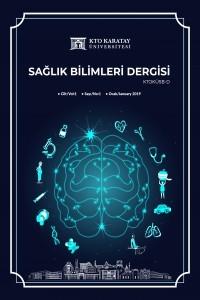Konya İlinde Yaşayan 18 Yaş Üstü Bireylerin Koronavirüs ve COVID-19 Aşısı Hakkındaki Algı ve Tutumları
Aşılar, Bulaşıcı hastalıklar, koronavirüs, halk sağlığı hemşireliği, pandemik
Perceptions and Attitudes of Individuals Over 18 Living in Konya Province About Coronavirus and COVID-19 Vaccine
Vaccines, Infectious diseases, Coronavirus, Public health nursing, Pandemic,
___
- Aker, A.A. (2018). Vaccine refusal. Communıty And Physıcıan 33 (3), 175-186.
- Altın, Z. (2020). Elderly people in Covid-19 outbreak. Journal of Tepecik Education and Research Hospital 30(ek sayı), 49-57. https://doi.org/10.5222/terh.2020.93723
- Artan, T., Karaman, M., & Cebeci, F. (2020). The scale of evaluation of perceptions and attitudes towards the Covid-19 outbreak evaluation. Turkish Journal of Social Work 4(2), 101-107. https://dergipark.org.tr/tr/download/article-file/1376965
- Demir Uslu, Y., Yılmaz, E., & Altun, U. (2021). Evaluation of health management and human resources management students' perceptions and attitudes towards the control and vaccine of Covid-19. Gümüşhane University Journal of Health Sciences 10(3), 383-397. https://dergipark.org.tr/en/download/article-file/1680057
- Dogan, M.M., Duzel, (2020). B. Fear-Anxiety Levels in Covid-19. Turkish Studies 15(4), 739-752. https://turkishstudies.net/turkishstudies?mod=tammetin&makaleadi=&makaleurl=2dbf0897-56b4-406c-aa44-4acc047da3bc.pdf&key=44678
- Erkekoglu, P., Erdemli Kose, S.B., Balci, A., Yirun, A. (2020). Vaccine hesitancy and effects of Covid-19. Journal of Literature Pharmaceutical Sciences 9(2), 208-220. https://www.turkiyeklinikleri.com/article/tr-asi-kararsizligi-ve-COVID-19un-etkileri-88601.html
- Ertaş, A., Kağan, G., Akçi, Y. ve Zelka, M. (2021). Knowledge, attitude and practices of Turkish society about Covid-19. Ekev Academy Journal 86, 1-20. https://doi.org/10.17753/Ekev1851
- Genis, B., Gurhan, N., Koc M, Genis, Ç., Sirin, B., Cirakoglu, O.C., & Cosar, B. (2020). Development of perception and attitude scales related with Covid-19 Pandemia. Social Sciences & Humanities 5(7):306-328. https://www.pearsonjournal.com/Makaleler/286789466_306-326.pdf
- Guan, W.J, Ni, Z.Y., Hu, Y., Liang, W.H., Ou, C.Q., He, J.X., et al. (2020). Clinical Characteristics of Coronavirus Disease 2019 in China. New England Journal of Medicine 382, 1708-1720. https://www.nejm.org/doi/10.1056/NEJMoa2002032#article_citing_articles
- Gulcicek, C. (2021). The effects of the coronavirus epidemic on global security and management, master's thesis, Bahçeşehir University Graduate Education Institute, İstanbul.
- Gunduz, F. (2020). Turkey's exam with the new coronavirus desiese (covid-19) epidemic: studies of building a safe future and public perceptions. International Journal of Euroasian Research 8(23), 447-467.
- Kesgin, S.S., & Durak, M.B. (2021). Pandemic and demography: the perceptions and attitudes towards Covid-19 pandemic by age groups. Journal of Social Change 3(1):6-23. https://doi.org/10.51448/tde.2021.1
- Lazarus, J.V., Ratzan, S.C., Palayew, A. Gostin, L.O., Larson, H.J., Rabin, K., et al. A global survey of potential acceptance of a Covid-19 vaccine. Nature Medicine 27, 225–228. https://doi.org/10.1038/s41591-020-1124-9
- Murphy, J., Vallières, F., Bentall, R.P., Shevlin, M., McBride, O., Hartman, T.K., et al. (2021). Psychological characteristics associated with COVID-19 vaccine hesitancy and resistance in Ireland and the United Kingdom. Nature Communications 12(1), 29. doi: 10.1038/s41467-020-20226-9.
- Salali, G., & Uysal, M. (2020). Covid-19 vaccine hesitancy is associated with beliefs on the origin of the novel coronavirus in the UK and Turkey. Psychological Medicine 1-3. https://doi.org/10.1017/s0033291720004067
- Troiano, G., & Nardi, A. (2021). Vaccine hesitancy in the era Covid-19. Public Health 194, 245-251.
- URL 1. COVID-19 Vaccine information platform. https://COVID19.saglik.gov.tr Accessed April 17, 2021.
- URL 2. World Health Organization. Health topics, vaccines and immunization. https://www.who.int/health-topics/vaccines-and-immunization#tab=tab_1 Accessed April 20, 2020.
- Uzum, O., Eliacik, K., Orsdemir, H.H., Oncel., E.K. (2019). Factors affecting the immunization approaches of caregivers: An example of a teaching and research hospital. Journal of Pediatric Infection 13(3), 144-149. doi:10.5578/ced.68398
- Yavuz, E. (2020). Covid-19 vaccines. Turkish Journal of Family Practice 24(4), 227-234. https://www.turkailehekderg.org/jvi.aspx?un=TAHD-88598&volume=24&issue=4
- Yilmaz Atar, A., Urgan, S., & Erdoğan, P. (2020). The study of optimism-pessimism and life satisfaction in terms of demographic variables during the covid-19 pandemic period. Pearson Journal of Social Scıences & Humanities 7(7):263-278.
- Yuksel, G., & Topuzoglu, A. (2019). Factors affecting anti-vaccination, Estudam Journal of Public Health 4(2), 244-258. https://doi.org/10.35232/estudamhsd.525983
- Yayın Aralığı: Yılda 3 Sayı
- Başlangıç: 2020
- Yayıncı: KTO Karatay Üniversitesi
Tele Hemşirelik Uygulamalarının İncelenmesi: Sistematik Derleme
Covid-19 Pandemisinde Planlı Ev Doğumları
Ebru BEKMEZCİ, Halime Esra MERAM
Menenjitin İşitme Sistemi Üzerindeki Etkileri
İrem KÖROĞLU, Bahriye HORASANLI
Couvade Sendromu Semptomlarının Görülme Sıklığı
Mustafa KILAVUZ, Refika GENÇ, Öykü UZUN, Kübra ÇAKICI, Rukiye YÜCEL, İlayda BİLGİN, Emine ÇETİN
Türkiye’de COVID-19 Pandemi Sürecinin Aile İçi İletişime Etkisi
Büyüme Faktörleri, Reseptörleri ve Sinyal İletim Yolları
Zeliha TUNCER, Leyla Didem KOZACI
Otizm Spektrum Bozukluğunda Müzik Terapinin Etkisi ve Hemşirenin Rolü
Konya İlindeki Bireylerin Evlilik Kalitesinin Sosyo-Demografik Özellikler Açısından İncelenmesi
